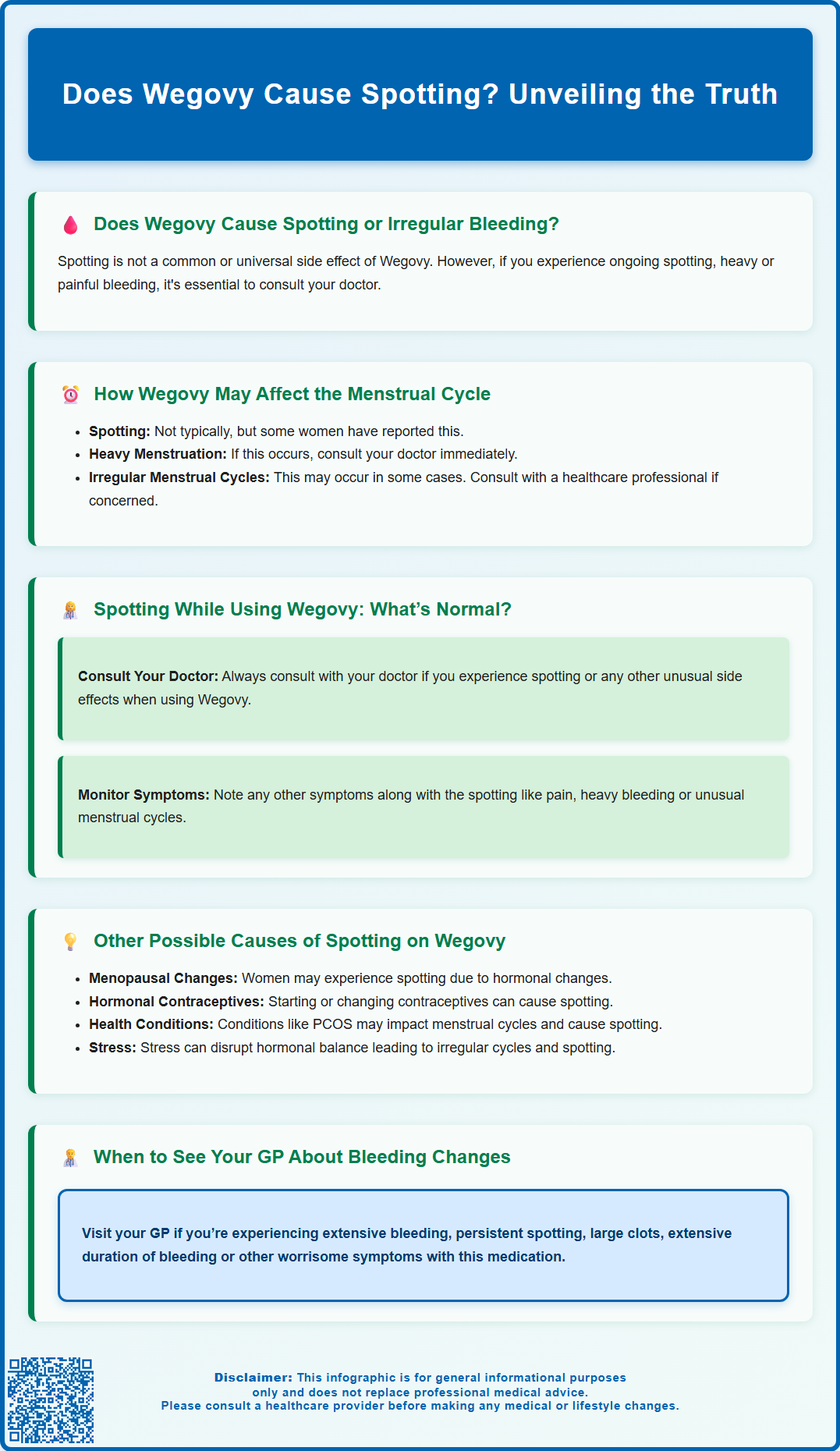Grasping the details about GLP-1 treatments just got easier with Bolt Pharmacy's comprehensive resources. Delve into our latest investigation on the recent discussions concerning Wegovy, a widely used GLP-1 medication regarding its potential side effects: Specifically, does it cause spotting? Whether you're a current GLP-1 user or pondering its applicability for weight management and metabolic health, our insightful exploration caters precisely to your quest for reliable information. Stick around, as we unfold whether spotting is a fact or a fallacy linked with Wegovy.
Summary: Wegovy (semaglutide) is not known to typically cause spotting, and this is not a recognised side effect. However, some women have reported changes to their menstrual cycle during treatment, which may be related to weight loss or other health factors.
- Wegovy is a GLP-1 receptor agonist that mainly affects blood sugar control, appetite, and digestion, not reproductive hormones.
- Spotting or irregular bleeding has not been identified as a common side effect, though some women report cycle changes whilst using GLP-1 medicines.
- Any unusual or persistent side effects, including spotting, should be discussed with a healthcare professional.
- Other factors such as hormonal changes, contraceptive use, stress, or other medical conditions can also contribute to spotting.
- Significant changes to your menstrual cycle, such as excessive bleeding, passing large clots, or prolonged bleeding, should prompt a consultation with your GP.
Table of Contents
- Understanding Wegovy and Its Common Side Effects
- Can Wegovy Cause Spotting or Irregular Bleeding?
- Why Menstrual Changes May Occur During Weight Loss Treatment
- When to Seek Medical Advice About Spotting on Wegovy
- Managing Unexpected Bleeding While Taking Wegovy
- Scientific References
- Frequently Asked Questions
Understanding Wegovy and Its Common Side Effects
Wegovy (semaglutide 2.4mg) is a prescription medicine licensed in the UK for weight management in adults with obesity (BMI ≥30 kg/m²) or those who are overweight (BMI ≥27 kg/m²) with at least one weight-related health condition. It belongs to a class of medications called glucagon-like peptide-1 (GLP-1) receptor agonists, which work by mimicking a naturally occurring hormone that regulates appetite and food intake. Wegovy is administered as a once-weekly subcutaneous injection and is intended for use alongside a reduced-calorie diet and increased physical activity.
The mechanism of action involves binding to GLP-1 receptors in the brain, particularly in areas that control appetite and food intake. This leads to reduced hunger, increased feelings of fullness, and consequently decreased caloric consumption. Additionally, semaglutide slows gastric emptying, which contributes to prolonged satiety after meals. Clinical trials have demonstrated significant weight loss in patients using Wegovy compared to placebo, with the medication receiving MHRA approval for weight management.
Like all medications, Wegovy is associated with a range of side effects. The most commonly reported adverse effects are gastrointestinal in nature, affecting the majority of users to some degree. According to the Summary of Product Characteristics (SmPC), these include nausea (affecting approximately 44% of patients), diarrhoea, vomiting, constipation, and abdominal pain. These symptoms are typically most pronounced during the initial dose escalation phase and often diminish as the body adjusts to the medication. Other recognised side effects include fatigue, dizziness, headache, and injection site reactions. More serious but less common adverse effects include pancreatitis, gallbladder problems, and increased heart rate. Wegovy is contraindicated during pregnancy and breastfeeding, and women of childbearing potential should use effective contraception while taking it and for at least 2 months after discontinuation. Understanding the established side effect profile is important when considering whether new or unexpected symptoms may be related to Wegovy treatment.
Can Wegovy Cause Spotting or Irregular Bleeding?
Spotting or irregular vaginal bleeding is not listed among the recognised side effects of Wegovy in the official Summary of Product Characteristics approved by the MHRA, nor does it appear in the patient information leaflet. The clinical trial data for semaglutide at the 2.4mg dose used in Wegovy did not identify menstrual irregularities or intermenstrual bleeding as a direct adverse effect of the medication. This means there is no established pharmacological mechanism by which semaglutide would be expected to cause spotting or bleeding between periods.
However, it is important to recognise that the absence of spotting in the official side effect profile does not mean that patients taking Wegovy never experience menstrual changes. Some individuals using Wegovy have reported menstrual irregularities, including spotting, though these reports remain anecdotal rather than being confirmed as causally related to the medication. The relationship between GLP-1 receptor agonists and menstrual function has not been extensively studied, and current evidence does not support a direct link.
When patients experience spotting whilst taking Wegovy, it is more likely to be coincidental or related to other factors rather than a direct pharmacological effect of semaglutide. The timing of starting a new medication and the onset of new symptoms can create an apparent association that may not reflect true causation. It is essential to consider alternative explanations for spotting, including gynaecological conditions, hormonal changes related to weight loss itself, or unrelated health issues. Importantly, any unexpected vaginal bleeding should prompt a pregnancy test in women of reproductive potential, as this is a crucial first step in evaluation. According to the MHRA SmPC, semaglutide does not reduce the efficacy of hormonal contraceptives, though severe vomiting or diarrhoea may potentially affect the absorption of oral contraceptive pills, requiring temporary additional contraceptive measures.

Why Menstrual Changes May Occur During Weight Loss Treatment
Significant weight loss, regardless of the method used to achieve it, can have profound effects on reproductive hormones and menstrual function. Adipose tissue (body fat) is not merely an energy store but an active endocrine organ that produces and metabolises hormones, particularly oestrogen. When substantial weight loss occurs, the reduction in adipose tissue alters the body's hormonal milieu, which can lead to changes in menstrual patterns, including irregular cycles, spotting, or temporary amenorrhoea.
In women with obesity, excess adipose tissue often leads to increased peripheral conversion of androgens to oestrogens, creating a state of relative oestrogen excess. As weight decreases, this conversion diminishes, and hormone levels begin to normalise. This transition period can result in irregular bleeding patterns as the endometrium responds to fluctuating hormone levels. Additionally, weight loss can affect the hypothalamic-pituitary-ovarian axis, the complex hormonal feedback system that regulates the menstrual cycle. Disruption to this axis, even temporarily, may manifest as cycle irregularities or intermenstrual bleeding. It's worth noting that very rapid weight loss or extremely low energy availability should be avoided, as these can exacerbate menstrual disturbances.
For women with polycystic ovary syndrome (PCOS), a condition strongly associated with obesity and insulin resistance, weight loss can be particularly impactful on menstrual function. Many women with PCOS experience irregular or absent periods due to hormonal imbalances. As they lose weight, insulin sensitivity improves and androgen levels may decrease, potentially leading to restoration of more regular ovulation. However, this transition can initially cause unpredictable bleeding patterns, including spotting. The metabolic improvements associated with weight loss—reduced insulin resistance, decreased inflammation, and improved lipid profiles—all contribute to hormonal rebalancing that may temporarily disrupt established (albeit irregular) menstrual patterns before ultimately improving cycle regularity in many cases. Women with PCOS should also be aware that improved ovulation with weight loss may increase fertility, which is important to consider if pregnancy is not desired.
When to Seek Medical Advice About Spotting on Wegovy
Whilst spotting may occur during weight loss for the reasons discussed, it is important to recognise when medical evaluation is necessary. Any unexpected vaginal bleeding warrants discussion with a healthcare professional, as it can indicate conditions unrelated to weight loss medication that require investigation and treatment. A pregnancy test should be performed promptly in women of reproductive potential who experience unexpected bleeding, as this is an essential first step in evaluation.
Specific circumstances that require urgent medical attention include severe unilateral abdominal pain with bleeding (which could indicate ectopic pregnancy), shoulder-tip pain, or feeling dizzy/faint, which may require emergency care. Postmenopausal bleeding (any vaginal bleeding occurring more than 12 months after the last menstrual period) requires prompt GP assessment and referral via the urgent suspected cancer pathway (two-week wait) in line with NICE guidance (NG12). Bleeding after sexual intercourse (postcoital bleeding) also requires prompt GP assessment and may need urgent referral if there are concerns about cervical abnormalities or cancer.
It is also advisable to consult a healthcare professional if spotting continues for more than two to three menstrual cycles, if periods become significantly heavier or more painful than usual, or if there are other menstrual changes causing concern. A GP can perform an appropriate assessment, which typically includes a pregnancy test, potentially blood tests to check for anaemia (full blood count) and ferritin levels, thyroid function if clinically indicated, and sexually transmitted infection testing where relevant. In some cases, referral to gynaecology services may be appropriate for further investigation, which could include pelvic ultrasound scanning or endometrial assessment in line with NICE guidance on heavy menstrual bleeding (NG88).
Patients should inform their healthcare provider about all medications they are taking, including Wegovy, hormonal contraceptives, and any over-the-counter preparations or supplements. This comprehensive medication history helps clinicians consider potential contributing factors. Women taking oral contraceptive pills should be aware that severe vomiting or diarrhoea (which can occur with Wegovy) may affect pill absorption, and additional contraceptive precautions may be needed during and for 7 days after such episodes, as advised by the Faculty of Sexual and Reproductive Healthcare (FSRH).
Managing Unexpected Bleeding While Taking Wegovy
If spotting occurs whilst taking Wegovy and a medical evaluation has excluded concerning gynaecological pathology, there are several approaches to managing this symptom. Firstly, maintaining a menstrual diary can be invaluable. Recording the dates, duration, and heaviness of bleeding, along with any associated symptoms, provides useful information for healthcare professionals and helps identify patterns that may guide management. This record can reveal whether irregularities are improving over time as the body adjusts to weight loss or whether intervention is needed.
For women using hormonal contraception, discussing the bleeding pattern with a GP or sexual health specialist may lead to adjustments in contraceptive method or formulation. Sometimes, changing the type of hormonal contraceptive or the way it is taken can help regulate bleeding patterns. For those not using hormonal contraception, and where appropriate after medical assessment, short-term hormonal treatment may occasionally be considered to regulate the menstrual cycle, though this decision must be individualised and made in consultation with a healthcare professional.
Lifestyle measures that support overall hormonal health may also be beneficial. Ensuring adequate nutrition despite caloric restriction is important—severe caloric deficit can exacerbate menstrual irregularities. Working with a dietitian to ensure the diet contains sufficient essential fatty acids, micronutrients, and protein can support hormonal function. If bleeding has been frequent or prolonged, checking for iron deficiency anaemia (with blood tests for full blood count and ferritin) may be appropriate, with iron supplementation if indicated. Managing stress through appropriate techniques, ensuring adequate sleep, and avoiding excessive exercise (which can contribute to menstrual disturbance) are all relevant considerations.
Patients should continue taking Wegovy as prescribed unless specifically advised otherwise by their prescribing clinician. Stopping the medication without medical guidance is not recommended, as this may affect weight management goals and potentially lead to weight regain. If spotting is particularly troublesome or persistent despite investigation and management attempts, a discussion with the prescribing doctor about the overall benefit-risk balance of continuing Wegovy is appropriate. It's important to note that Wegovy should be discontinued immediately if pregnancy occurs, as semaglutide is contraindicated in pregnancy and breastfeeding. Women planning pregnancy should stop Wegovy at least 2 months before attempting to conceive, as advised in the SmPC. In most cases where menstrual changes occur during weight loss, these settle as weight stabilises and the body adapts to its new metabolic state. Regular follow-up with healthcare professionals throughout the weight loss journey ensures that any concerns, including menstrual irregularities, are addressed promptly and appropriately, supporting both the safety and success of treatment. All patients should also be encouraged to report any suspected side effects, including menstrual changes, through the Yellow Card Scheme to help monitor the safety of Wegovy and other medicines.
Scientific References
- Wegovy 0.25 mg, FlexTouch solution for injection in pre-filled pen - Summary of Product Characteristics (SmPC).
- Wegovy: EPAR - Medicine Overview.
- Semaglutide for managing overweight and obesity (TA875).
- Suspected cancer: recognition and referral (NG12).
- Contraceptives, interactions - Treatment summaries (BNF).
Frequently Asked Questions
Does Wegovy cause spotting or irregular menstrual bleeding?
Wegovy (semaglutide), a GLP-1 receptor agonist, is not known to commonly cause spotting or irregular menstrual bleeding. However, some women have reported changes to their cycle during treatment. These changes are more likely linked to weight loss or other health factors rather than a direct effect of the medicine. If you notice persistent spotting or heavy bleeding, consult a healthcare professional promptly.
Can Wegovy affect my menstrual cycle?
Wegovy itself does not directly affect reproductive hormones, but weight loss and changes in nutrition or body composition during treatment may influence the menstrual cycle. Some women report irregular periods or spotting whilst using GLP-1 medicines, but this is not a recognised or common side effect. Speak with a healthcare professional if you notice changes to your cycle.
What should I do if I experience spotting while taking Wegovy?
If you experience spotting or irregular bleeding whilst taking Wegovy, it is important to seek advice from a healthcare professional. Such symptoms are unlikely to be caused directly by Wegovy but may point to another underlying issue that needs medical assessment. Do not stop treatment without medical guidance.
The health-related content published on this site is based on credible scientific sources and is periodically reviewed to ensure accuracy and relevance. Although we aim to reflect the most current medical knowledge, the material is meant for general education and awareness only.
The information on this site is not a substitute for professional medical advice. For any health concerns, please speak with a qualified medical professional. By using this information, you acknowledge responsibility for any decisions made and understand we are not liable for any consequences that may result.
Heading 1
Heading 2
Heading 3
Heading 4
Heading 5
Heading 6
Lorem ipsum dolor sit amet, consectetur adipiscing elit, sed do eiusmod tempor incididunt ut labore et dolore magna aliqua. Ut enim ad minim veniam, quis nostrud exercitation ullamco laboris nisi ut aliquip ex ea commodo consequat. Duis aute irure dolor in reprehenderit in voluptate velit esse cillum dolore eu fugiat nulla pariatur.
Block quote
Ordered list
- Item 1
- Item 2
- Item 3
Unordered list
- Item A
- Item B
- Item C
Bold text
Emphasis
Superscript
Subscript










